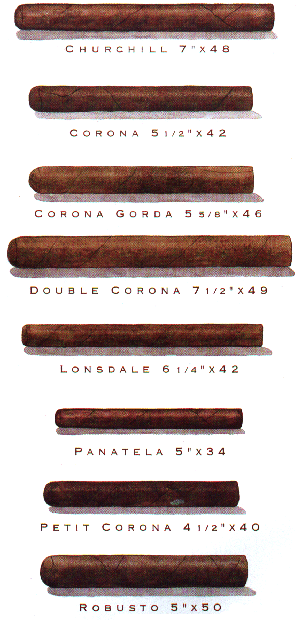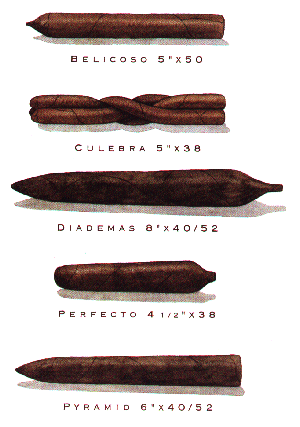Don't bother trying to make sense of the cigar
lexicon as it's not supposed to make any sense. At least, it
doesn't appear to, anyway.
The names of cigar sizes rarely have anything to do with the
actual size of the cigar. There aren't any universal
standards to go by, so the best you can do is keep in mind that
the size thing is just a guideline. And that is no more
readily apparent than after you notice that one manufacturer's
churchill is the the same size as another's double corona.
There are, however, "classic" measurements which will,
when you become more familiar with them, allow to to make some
general assumptions about a cigar's size. For instance,
after you get to know the classic measurements, the next time you
see the words "Double Corona" on the outside of a cigar
box you'll know right away that what's inside is not a collection
of short cigars.
But then you'll also want to keep in mind that just because the
box says "Churchills" doesn't mean the cigars are going
to be 7 inches long with a 48 ring gauge.
All you really need to remember is that cigars, in terms of their
size, are generally listed by length in inches and the ring gauge,
or the cigar's girth, which is in 64ths of an inch. So, a
classic churchill is 7 inches long and 48/64ths of an inch thick.
Cigars can also be divided into two shapes, parejos,
meaning straight sided cigars, and figurados, those with
irregular sides.
The following two diagrams illustrate both cigar shapes and
classic measurements.




As with the straight sided cigars, the classical measurements for
figurados are not necessarily the same measurements that you will
find on cigars at your local tobacconist. Remember, they're
just general guidelines.

When it comes to a cigar's color,
what you're dealing with is the color of the cigar's wrapper, the
leaf on the outside of the cigar.
At present, there are 6 major color grades of wrapper in
use. They are as follows:
Double Claro - A light green
wrapper color often called candela or claro claro.
Manufacturers cure the leaf with heat to fix the chlorophyll in
the leaf. Sometimes these leaves have a sweet flavor.
Claro - A light tan color,
usually soft and silky to the touch. This wrapper is grown
under shade tents and is ideal for that elegant look and for it's
somewhat neutral flavor qualities.
Natural - Often called EMS, or
English Market Selection. A light brown to brown color and
typically shade grown. It has a bit more pronounced flavor
than claro wrapper.
Colorado - This wrapper is a
brown to reddish-brown color and is also typically shade
grown. It can often have a richer flavor than natural
colored wrapper.
Maduro - From the Spanish
meaning "ripe," this wrapper is more dark in color than
natural or colorado because it stays on the plant longer. It
normally has an oily look and feel and is somewhat stronger in
flavor.
Oscuro - Also called black or
negro in some countries. It is left on the plant the longest
and typically produces a very rich flavor.
These colors look like this:

|